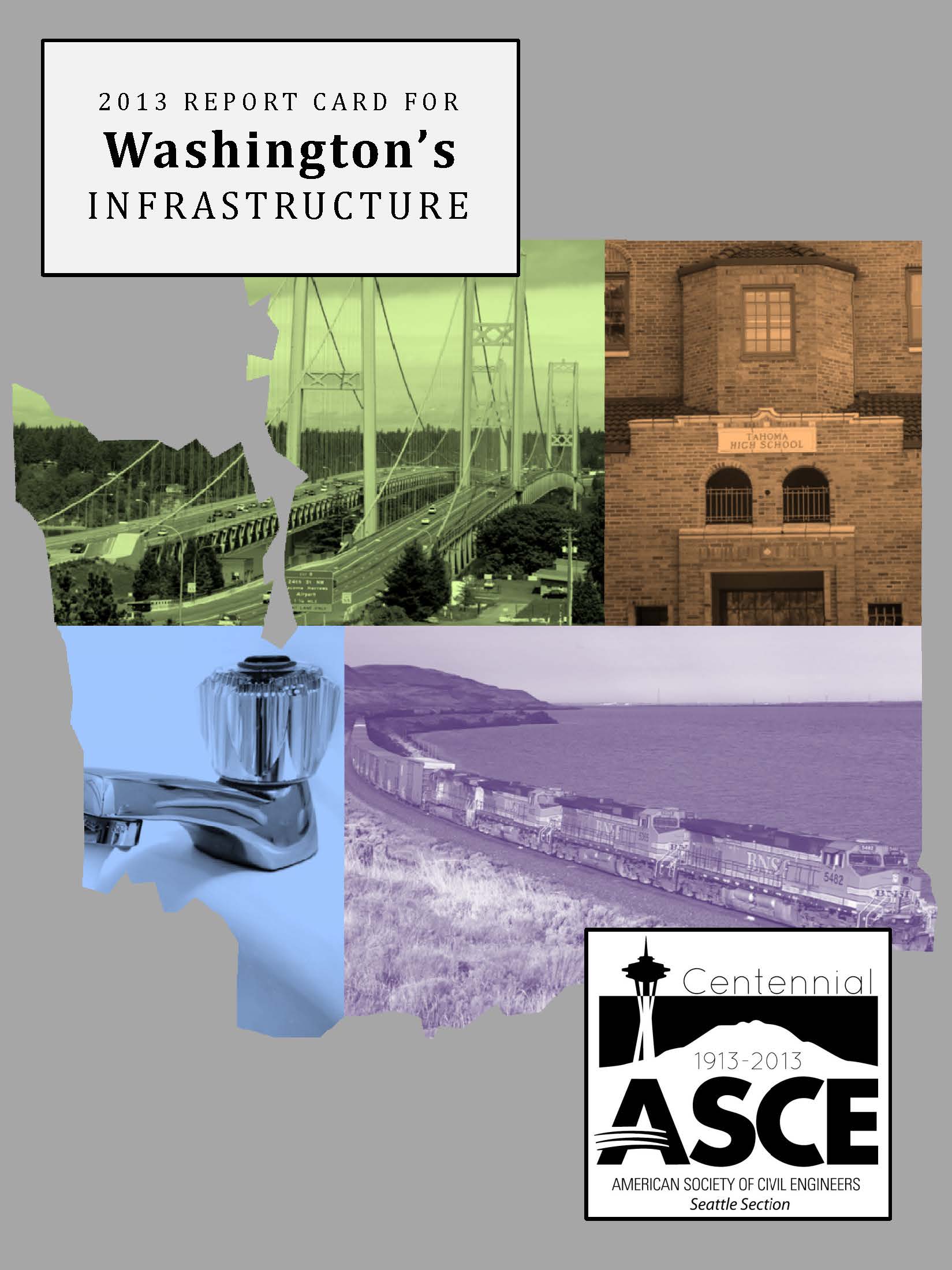 2013 Report Card for Washington's Infrastructure
2013 Report Card for Washington's InfrastructureThe purpose of the 2013 Report Card for Washington's Infrastructure is to offer the public and policymakers an easy to understand assessment of how our infrastructure is doing and what needs attention. This report finds that WA infrastructure earned a cumulative GPA of C. The analysis was conducted over the past year by a team of infrastructure experts from the Seattle Section of the American Society of Civil Engineers. The 2013 Report Card for Washington's Infrastructure concludes that while Washington has many types of infrastructure and many great facilities across the state, a lack of planned and guaranteed funding and inadequate maintenance are reported across all nine categories -Aviation, Bridges, Dams, Drinking Water, Rail, Roads, Schools, Solid and Hazardous Waste, and Transit.
Read the full 2013 Report Card for Washington's Infrastructure here.
 Aviation
Aviation Bridges
Bridges Dams
Dams Drinking Water
Drinking Water Rail
Rail Roads
Roads Solid Waste
Solid Waste Transit
TransitA: Exceptional, B: Good, C: Mediocre, D: Poor, F: Failing, ?: Incomplete
Each category was evaluated on the basis of capacity, condition, funding, future need, operation and maintenance, public safety, resilience, and innovation
Aviation
64 public-use airports
Bridges
372 of the 7,902 bridges are structurally deficient
Bridges
$146 million in bridge funds came from the Federal Highway Bridge Fund in 2011
Dams
99% of the state regulated dams have an Emergency Action Plan
Dams
180 high hazard dams
Drinking Water
$9.5 billion in drinking water infrastructure needs over the next 20 years
Energy
74.905 gigawatt-hours of renewable energy every year, ranking it 1st
Hazardous Waste
49 sites on the National Priorities List
Inland Waterways
1,060 miles of inland waterways, ranking it 9th nationally
Levees
713 miles of levees
Ports
115.6 million short tons of cargo in 2012, ranking it 5th nationally
Public Parks
$218.3 million of unmet needs for its parks system
Rail
23 freight railroads covering 3,215 miles across the state, ranking 20th nationally by mileage
Roads
9,104 of the state’s 83,878 public roads are major roads, and 22% are in poor condition
Roads
$2.8 billion a year in costs to motorists from driving on roads in need of repair, which is $537 /yr per motorist
Schools
$6.3 billion in estimated school infrastructure funding needs
Transit
230.4 million annual unlinked passenger trips via transit systems including bus, transit, and commuter trains
Wastewater
$5.3 billion in wastewater infrastructure needs over the next 20 years

March 03, 2017
As the President’s repeated in his address to Congress his pledge to dramatically increase infrastructure spending to the tune of $1 trillion, various Congressional Committees

March 01, 2017
On Tuesday night, President Trump addressed a joint-session of Congress for the first time in his presidency. Infrastructure was among the many issues he discussed.

February 28, 2017
U.S. motorists set a new record for vehicle miles travelled (VMT) in 2016, driving over 3.2 trillion miles, an increase of 70 billion miles from

February 17, 2017
Romantic dates, the Grammy awards and celebrating black history are not the only milestones of this week; the Oroville dam crisis in California and the